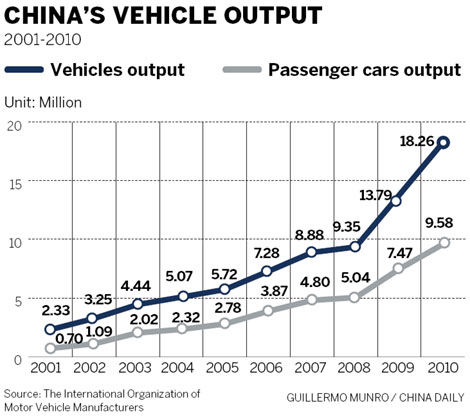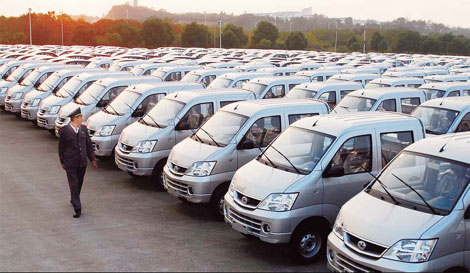Industry has broken records
Updated: 2011-12-09 08:17
By Li Fangfang (China Daily)
|
|||||||||
|
Minivans are ready to be shipped at a car factory in Nanchang, Jiangxi province. China has become the world's largest car maker and market. [Huo Guolin / For China Daily] |
Ownership of cars has become a reality from an out-of-reach dream in 10 years
When Xu Feng bought a car nearly 12 years ago he instantly became a mini-celebrity among his relatives and friends.
Having a new car in China in those days had so much cachet that it also "brought me confidence as a businessman", Xu said.
When Xu bought his Citroen Fukang sedan with a 1.6 liter engine he had to fork out 120,000 yuan ($18,900; 14,000 euros), a small fortune at the time, and a hefty proportion of his savings.
These days if you want to buy a second-hand Fukang (it is now out of production) the car, made by the Dongfeng Peugeot-Citroen Automobile Group, a joint venture of France's PSA Peugeot Citroen and the Chinese manufacturer Dongfeng Group, will set you back a mere 30,000 yuan.
Something has obviously changed in China, because not only has the cost of cars become much cheaper, but the aspirations of car owners and potential car owners have become much loftier.
In 2006 Xu replaced his Fukang with an Audi A6; now he enjoys the comfort of sitting in a chauffeur-driven Mercedes-Benz S-Class.
"I also love to drive our Porsche Cayenne SUV with my wife during the weekend or on holidays," Xu said. "Last year we bought a Mini as a birthday gift for our daughter. If it were not for Beijing's quota policy I would have a sports car, either a Ferrari or a Porsche, in my garage, too."
Xu's dream has been fulfilled partly as a result of China's entry into the WTO, which sharply cut tariffs, encouraged local cooperation and production, and halved the average price of vehicles.
Such changes gave the industry such a fillip that these days demand often exceeds supply, and buyers have to wait for long periods or pay extra to get popular models.
After China's entry to the WTO in 2001 the automotive industry went into top gear, and in the past 10 years sales have surged from 2 million a year to 18 million a year. That in turn has attracted more foreign automotive companies to invest, and has driven the growth of local automotive companies. Since 2009 China has been the world's No 1 for vehicle sales.
But just as Xu Feng relishes his car dream coming true, there are plenty of others who see in all the figures the realization of a nightmare. As millions of cars have made their way on to the roads of China, motorists have had to get used to hellish traffic jams, and in big cities such as Beijing and Shanghai people have had to get used to dreadful pollution.
To put a speed bump under the surging numbers, Shanghai has introduced auctions for number plates and Beijing has introduced a ballot system for car purchases, measures that have been controversial.
China's WTO chief negotiator, Long Yongtu, looking back at the negotiations for China's entry, said the automobile industry was the most difficult issue.
"Nobody foresaw it would turn out to be one of the most successful and prosperous industries, bringing huge changes and direct impact on an individual's life 10 years later."
The industry has changed dramatically, said Zhang Xiaoyu, vice-president of the China Machinery Industry Federation.
"The Chinese automotive industry was a fledgling sector during the WTO accession negotiations. Since China's entry it has developed into a major industry, and the axis of the global auto market has shifted. China will undoubtedly play a very important role in the development of the global automotive industry in the 21st century."
Since 1979, when China started to allow foreign companies to establish joint ventures, the market has shown great potential, and that has attracted many foreign marques to invest in the country.
Zhang said the automobile industry was stagnant before 2000, in particular the 10 years before the country joined the WTO. Annual vehicle sales in that period grew slowly, from 1.2 million in 1992 to 2 million in 2000.
In 1998 and 1999 several auto manufacturers suffered huge losses.
In 2000 the world's total vehicle production and sales reached 60 million units, mainly by automakers from the US, Germany, Japan, France and Italy.
Even if China's automobile industry was in poor shape, there were concerns that joining the WTO not only would not help it but would be detrimental.
When China started to discuss the industry with the WTO in 1997 the tariff for imported vehicles reached 180 to 220 percent. By 2005 that had been cut to 25 percent and the vehicle import quota was abolished.
Moreover, the government removed the policy on limiting foreign and private enterprises taking part in vehicle production.
Just a day before China entered the WTO, Zhejiang Geely Holding Group Co, the first private automaker, received approval to produce its first model, the Geely JL6360. Now the homegrown brand is known worldwide through its acquisition of the century-old Swedish Volvo Car Corp last year.
More Chinese automakers, after selling their cars overseas, have started to establish production facilities outside China to further expand in the global market.
In 2000 China exported only 15,000 vehicles. The number was 560,000 last year, and total revenue was $51.8 billion.
China's entry to the WTO also gave the Chinese automotive industry the opportunity to compete against well-established foreign rivals in domestic and overseas markets.













